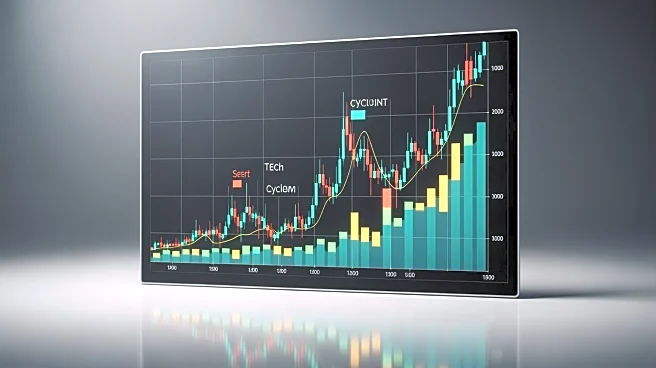What's Happening?
The U.S. stock market has quickly regained its footing following a significant decline on Tuesday, which saw the S&P 500 drop by 1.2%. This decline was primarily driven by high-beta semiconductor and AI-levered tech stocks. However, the market has bounced
back, with the S&P 500 recovering about two-thirds of the previous day's losses. Key sectors such as consumer cyclicals, including airlines and regional banks, have shown improvement, aided by better-than-expected macroeconomic indicators like ADP private payrolls and ISM Services data. Additionally, there is optimism surrounding the potential resolution of the government shutdown and Supreme Court arguments that could disallow President Trump's emergency tariffs.
Why It's Important?
The rebound in the stock market is significant as it reflects investor confidence in the resilience of the U.S. economy despite recent volatility. The recovery in tech stocks and consumer cyclicals suggests a shift in market sentiment, with investors responding positively to macroeconomic data and potential policy changes. This development is crucial for stakeholders in these sectors, as it may lead to increased investment and growth opportunities. Furthermore, the correlation between stock indexes and Treasury yields indicates that equities are more sensitive to economic growth concerns than inflation, which could influence future investment strategies.
What's Next?
Looking ahead, the market will be closely monitoring several factors, including the December Federal Reserve rate-cut decision and ongoing discussions about President Trump's tariffs. The consumer sector still faces challenges, and the 'AI bubble' chatter remains a concern. However, with seasonal factors potentially favorable and earnings showing strong growth, the market may continue its benign trend. Investors will also be watching credit markets for signs of stress, which could impact future market movements.
Beyond the Headlines
The recent market dynamics highlight the complex interplay between economic indicators, policy decisions, and investor sentiment. The potential disallowance of tariffs could have broader implications for trade relations and fiscal policy, affecting various industries. Additionally, the focus on tech stocks and AI-related sectors underscores the ongoing debate about the sustainability of their growth and valuation.















